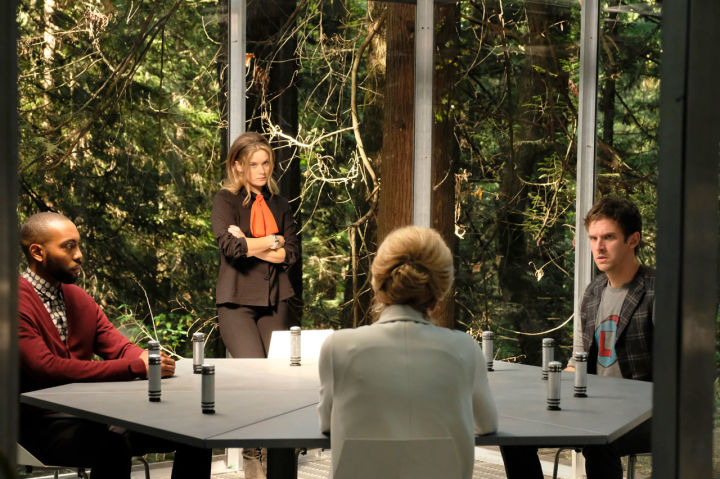'Legion' Spoiler Review: Thoughts On "Chapter 2"
The first episode of Legion was one of the most impressive television pilots I've ever seen, a bold and unique free-fall into a fresh corner of a familiar world. The first live-action X-Men show broke the mold carefully established by the movies – anything feels possible.
So, does the second episode, simply titled "Chapter 2," live up the promise of that first chapter? Let's take a look in our new spoiler review...
Catching Our Breath
After the breathless insanity of "Chapter 1," it should come as no surprise that "Chapter 2" taps the brakes on Legion's eccentricities, pausing just long enough for everyone (the characters onscreen and the audience at home) to find their bearings. If the pilot was all about launching everyone into a brand new and dangerous world, the follow-up is about defining the boundaries and rules of that world and explaining the roles of everyone within it. The supporting characters have names and dialogue now! Legion is a real show!
And Legion is still a very good show in its second hour, even if it's never quite as audacious and visually stunning as "Chapter 1." In many ways, it's a more traditional X-Men adventure, introducing elements and characters that should be familiar to both comic readers and movie watchers alike (while remaining steadfast in the decision to not directly tie these events to any larger continuity). In true FX fashion, Legion is still a handsome show and it's still an odd show and it's still a show that refuses to coddle you and hold you by your hand, but I'll admit that I miss the glorious cocktail of confusion and goofy mayhem seen in the first episode. The plot had to kick in at some point, but I hope the series' delicate tone can survive more traditional waters.
Summerland, or: Not Quite's Xavier's School
"Chapter 2" shifts locations from institution to another, removing David Haller from Clockworks and placing him in Summerland, Legion's answer to Xavier's School For Gifted Youngsters. Only this isn't quite a boarding school and most of those living on the grounds don't appear to be youngsters. And unlike Professor X, who brought mutants together with a gentle touch and exuded a calming presence that made him an instantly trustworthy leader, there's something fishy about Summerland and its leadership. Jean Smart's Melanie Bird may be a psychic mutant, but her manner is a bit more aggressive, immediately throwing David into a treatment he doesn't understand. The grounds themselves resemble more of a cult compound than an institution of learning and healing, and those handles David grips to begin his psychic "memory work" recall the meters Scientologists use during their "audits" of potential new members. And let's face it, no fictional institution that recalls Scientology should be trusted.
While Summerland is as disconcerting as any location we've seen in Legion so far (and no place ever feels safe or comfortable on this show), it is certainly a place worthy of additional exploration. New characters like Bill Irwin's Cary Loudermilk are strange enough to raise their own sets of questions and announcements referencing rules about levitation and time travel classes suggest a much larger world than we've seen. If Legion is planning to settle down at Summerland for the long haul, at least there's going to be plenty to do.
Ptonomy and the Dream Team
We met Jeremie Harris' Ptonomy Wallace in "Chapter 1," where he was just a dapper fellow armed with a machine gun who assists David in escaping from his government captors. In "Chapter 2," we get to know him a bit and finally learn his powers: he's a psychic who can access the memories of others and help them relive important moments. He seems to have other abilities as well, like being able to put someone to sleep with a simple suggestion. Psychic abilities seem to be flexible and difficult to strictly define in Legion, which is appropriate for a show where every moment hinges on uncertainty and dread.
It should be noted that Ptonomy's powers have no real use in a combat situation, but he's still part of Summerland's front line and was still an active participant in the rescue mission that brought David into the fold. A mutant superhero whose abilities have no offensive applications but who still fights using more traditional methods is one of the X-Men-iest things any show or film connected to this universe has ever done. The more Legion strays from the established template, the more it evokes the source material.
The Exact Nature of David's Powers
Over the past two episodes, David's mutant powers have manifested themselves in a number of ways. He has controlled objects with his mind, transformed doors into solid walls, teleported an MRI machine onto Summerland's front lawn, and seemingly projected his mind into the halls of Clockworks, where his astral form (for lack of a better term) was able to communicate with his sister. At this point in the show, David's abilities are intentionally vague and beyond our understanding. After all, David doesn't know exactly what he can do and neither does anyone else observing him, whether they're government or mutant.
This is where comic book fans have to tread on thin ice. Since the show hasn't revealed what drives David's powers, it would be unfair for an article (even a "spoiler review") to speak of their nature. David Haller's skill set has been defined in the pages of the X-Men comics and nothing we've seen in the show directly conflicts with the source material yet. Still, Legion is very much a loose adaptation and it's taking its sweet time exploring what our hero can do with his brain powers. Anything can change. Any sentence that begins with "Well, in the comics..." is a sentence that could rain on the parade of a show watcher.
So let's stick with what we can see on screen and that alone: David's telekinetic powers seem capable of manifesting themselves in a number of ways and he has limited control over them. Whether the show will ultimately treat him as a hero in control of his powers or a man with unique abilities who can barely take care of himself remains to be seen. The comic book David Haller always straddles a fine line between both.
The Unreliable Brain
While "Chapter 2" dials back the overall nuttiness of the pilot, it ramps up the mysteries. Ptonomy's memory work sessions with David prove that his own mind is something of an unreliable narrator – nothing lurking in the crevices of his brain can be trusted. Melanie Bird may insist that David's schizophrenia isn't real, that his problems are just powers that have yet to be defined, but the man's own psychic interior begs to differ.
David's memories contain a number of mysteries: Who is his father and why can't we see his face? Did his parents actually read him a traumatizing children's book full of violent imagery or is that another delusion? When his "astronomer" father took young David out to look at the stars and the stars "spoke" to him, what did they say? These answers have been blocked, deliberately hidden by David's own psyche. Since the mind can bury trauma deep into the recesses of the subconscious to protect someone from further harm, it looks like the Summerland crew will have to dig deep into a troubled mind that has gone out of its way to mask its secrets if they want to learn more about their newest recruit.
It is these scenes that work the best in "Chapter 2," mainly because they're where the show is able to really cut loose with storytelling and abandon traditional narrative form. Familiar cinematic techniques become literal visualizations of abstract concepts, like a jump cut in David's memory of a psychiatric session standing in for a repressed memory. And then there's David's father, his face masked by artificial shadows that would feel out of place in any scene striving for "realism." In a memory, in a place where dream logic can apply, those very specific shadows stop being a familiar cinematic artifice representing a hidden identity and start being evidence that memories of David's father have been blocked for reasons that have yet to be explored. Someone, whether it was David or an outside force, doesn't want him knowing anything about the man who raised him (and possibly traumatized him). And then there's the way Legion shifts aspect ratios for certain scenes, although it's not quite clear why that's happening just yet.
It should be noted that a brief Google search will reveal the identity of David Haller's comic book father in a matter of seconds. If Legion is preparing for a similar relation, they're going a fine job of building up to it. If you want to stay fresh, I'd recommend not reading any X-Men Wikipedia pages for a few weeks.
Lenny and the Devil With the Yellow Eyes
While we've certainly heard the many voices living inside David's mind, we've only made contact with two of them: Aubrey Plaza's Lenny, who joined his psychic interior after her accidental death in "Chapter 1," and the terrifying Devil with Yellow Eyes, who continues to show up at inopportune and startling moments in "Chapter 2." It's telling that the Devil arrived moments before David's powers were used to seal those walls in Clockworks and that he arrived again right before David transported that MRI machine outside of the Summerland. Legion has yet to explore the true nature of this thing and its intentions for David, but it has a definite connection to his abilities and seemingly allows him to perform the most impressive and impossible of his feats.
But what about Lenny? What's her deal? It's still not clear how the personality of a dead Clockworks patient has wormed her way into David's mind. Since his brain has previously been established as unreliable and filled with deceptions, it's not even clear if his memories of hanging out with her and scoring drugs are even real. Did he actually know Lenny before they were committed at the same time? It's telling that the show hasn't fully defined their relationship – the last thing David can trust at this point is his own mind.
David and Syd Are Adorable
In a show that is mostly about grim super powers and mental illness and internal monsters manifesting themselves in literal ways, every single scene between Dan Stevens' David and Rachel Keller's Syd Barrett comes as a welcome reprieve. These two are adorable together, with Stevens and Keller showcasing a goofy chemistry that is sweet and odd in ways that ring true, even as they're surrounded by telekinesis and body-swapping. Their "romance of the mind," devoid of physical contact but filled with just enough accidental mind-reading and flirtatious dialogue, is a refreshing after-dinner mint in the midst of Legion's steak dinner of a core plot.
Going forward, it's easy to imagine Legion falling further down the rabbit hole of psychosis and dread and psychic misery. Knowing that the series can always retreat to these when necessary to give us a breather feels like a promise I hope the show keeps.





